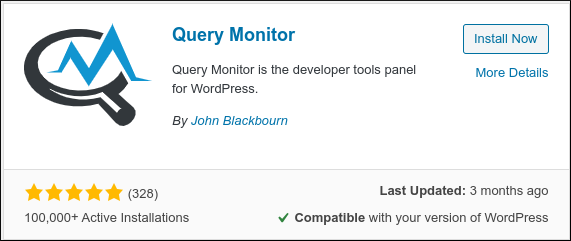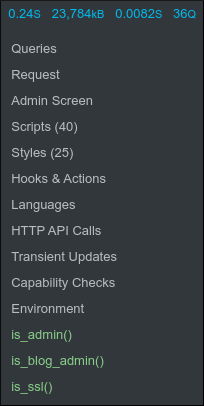Installing and using the Query Monitor plugin
This article describes how to install and use the Query Monitor plugin, a debugging tool that helps you monitor WordPress performance.
This article describes how to install and use the Query Monitor plugin, a debugging tool that helps you monitor WordPress performance. With Query Monitor, you can track many things, including:
-
Database queries.
-
HTTP request and response headers.
-
Scripts, including hooks and actions.
-
Site environment information, including the server, PHP, MySQL, and WordPress.
NoteFor more information about what Query Monitor can do, please visit https://github.com/johnbillion/query-monitor.
Installing the plugin
To install Query Monitor on your WordPress site, follow these steps:
-
Log in to your WordPress site as the administrator.
-
In the left sidebar, click Plugins:

-
Click Add New.
-
In the Search plugins text box, type
query monitor, and then press Enter:

-
Locate Query Monitor, and then click Install Now:

-
After WordPress finishes installing the plugin, click Activate. The Query Monitor appears in the toolbar:

Using the plugin
After you install the Query Monitor plugin, you are ready to monitor your site. To do this, follow these steps:
-
Log in to your WordPress site as the administrator.
-
On the toolbar, select an option from the Query Monitor menu:

For complete information about all of these options, please see the Query Monitor documentation at https://github.com/johnbillion/query-monitor. Some of the most useful options are:
-
Queries: This option shows the raw database queries that were used to help generate the current page, as well as the functions that ran the queries.
-
Request: This option shows the HTTP request for the current page.
-
Scripts: This option shows all of the script files loaded for the current page.
-
Styles: This option shows all of the style (CSS) files loaded for the current page.
-
Hooks & Actions: This option shows all of the hooks and their associated actions for the current page.
-
Environment: This option shows environment settings for the site, including PHP, MySQL, WordPress, and the web server.
More information
For more information about the Query Monitor plugin, please visit https://wordpress.org/plugins/query-monitor.
Related articles
Updated 2 months ago
